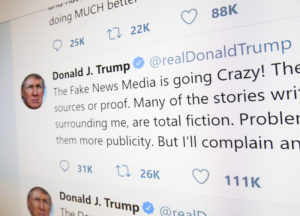Trump’s War on the Press: Two Veteran Journalists Speak Up

On October 17, I attended a discussion at the Brookings Institution in Washington, DC, between legendary CBS journalists and lifelong friends Dan Rather and Marvin Kalb. They were there to discuss Kalb’s latest book, Enemy of the People: Trump’s War on the Press, the New McCarthyism, and the Threat to American Democracy.
Kalb was prompted to write the book when President Trump called the media “the enemy of the people” in 2017, which reminded him of former Soviet leader Nikita Khrushchev’s use of the phrase in the post-Stalinist era. Citing recent public studies indicating that more than a third of Americans surveyed don’t trust the media, Kalb pointed to the president and other politicians who attack the press while at the same time enjoying free airtime. Kalb also contrasted Trump with conservative Senator Joseph McCarthy (R-WI), noting that McCarthy was eventually criticized and stopped by his own political party after spewing lies and false accusations against alleged communists in the government and in other US institutions and industries. Trump’s anti-media rhetoric and lies, however, have received little to no pushback from today’s Republic Party. “I’m not saying in any way that President Trump has any leanings whatever towards communism, fascism, or anything like that, so put that aside,” Kalb said. “What I am saying is that when you examine what it is that he has done and what he has said, that to me adds up to a program of weakening certain fundamental pillars of American democracy.”
During his closing remarks, Kalb urged the audience to get out and vote during elections and to be aware of today’s media coverage regarding critical issues of the day. I was able to ask Kalb whether the deregulation and corporate concentration of private media were factors in the rise of Trump-like politics.
“Yes, it does have something to do with it,” Kalb answered. “And there is a larger, more fundamental question about the public’s loss of trust in what it is that the press is saying. That, to me, is at the heart of the dilemma today with the press and the public.” The overarching message from the two veteran broadcast journalists was the need to keep the media in check and for the media to be transparent and aggressive with those in power.
As humanists, we must always be vigilante about the content the media produces. Past media reforms, like the fairness doctrine of 1949 or anti-trust laws of the early twentieth century Progressive Era, ensured that private sector media was competitive and provided fair, accurate news. However, with deregulation in the 1980s and ’90s, the oligopolies on media and entertainment began to rise. Subjective and sensational news coverage continued to increase in frequency after the repeal of the fairness doctrine in 1987.
What we need today, throughout all mediums, is more facts and news reporting rather than subjective punditry (as Washington Post publisher Katherine Graham once said, “News is what someone wants suppressed. Everything else is advertising”). We need the breakup of monopolistic media companies, increased media literacy, and a strengthening and expanding of public broadcasting. We need to combat misinformation online and supporting nonprofit, independent journalism in order to make American media and journalism great once more.
